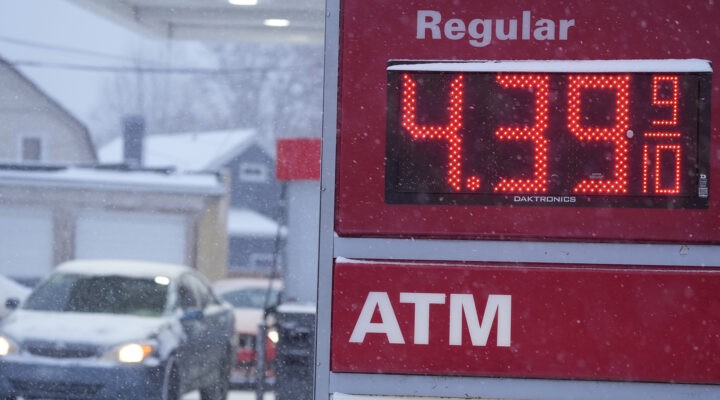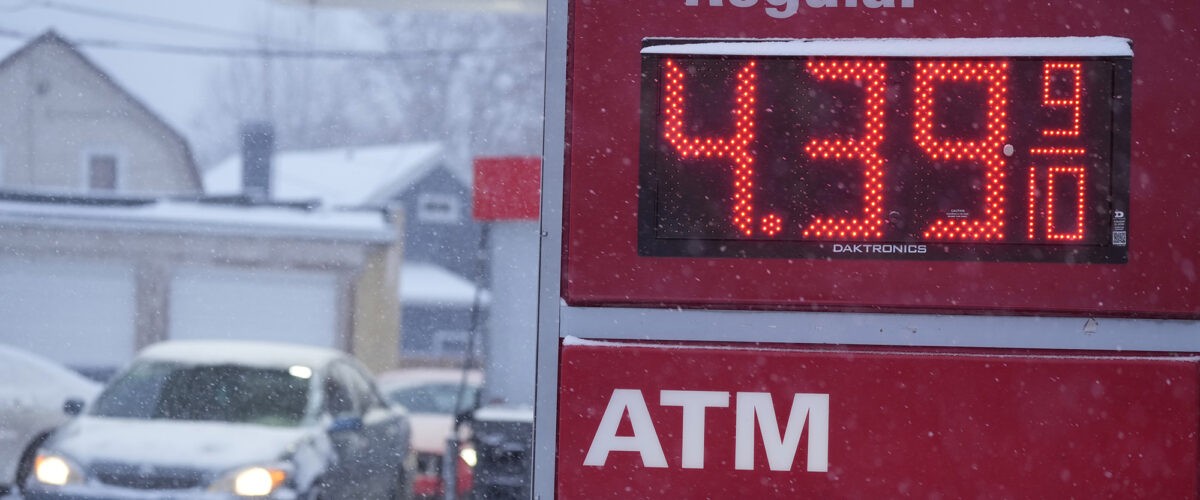Sky-rocketing prices at the pump are showing no signs of slowing down. Some experts predict they are set to soar even higher. The national average price for a gallon of gas just hit $4.06, up a staggering 45 cents from a week ago. This is the highest level since July 2008, according to the American Automobile Association’s “gas” website.
I’m not an oil and gas expert, but every article I have read points to the Russian invasion of Ukraine as the primary reason gas prices are soaring.
Russia is the third-largest producer of crude oil in the world, accounting for about 12% of global crude exports, according to the Information Energy Agency. The gas market will become even tighter if Russia’s oil supply to the rest of the world is cut off.

Ellis Orozco
All signs are pointing to a year-long struggle with rising prices. How does a Christian respond? I’ll get to my thoughts on that question, but first, there are a few realities to consider.
First, we are at war with Russia. The unprecedented scope and intensity of the sanctions imposed on Russia are tantamount to a declaration of war. These sanctions (and they are growing daily) are designed to cripple Russia and end the war.
If the sanctions work, it could spell a new, almost bloodless way to defeat an aggressor. It also could send a message to the other fascist regimes that the world unites against dictators and no longer tolerates war-mongering states.
There is, however, a price that comes with this economically centered warfare. The world has shrunk, and every country is tied to others. The very reason that the sanctions could work like never before also is the reason we will suffer in the process.
It is impossible to create suffering in Russia without also feeling the pain in America (and everywhere else).
Second, we are united with more than 30 other countries in our economic war with Russia. We are not in this war alone. More importantly, Ukraine is not in it alone. The growing coalition against Russia is an encouraging sign.
In an unprecedented move, McDonald’s, Starbucks and Coca-Cola are pulling out of Russia. The growing global coalition against Russia’s aggression coupled with the voluntary actions of these global corporations signals a new way to hold fascist states accountable.
Third, we are potentially saving thousands of American lives. If these unprecedented and unified sanctions don’t work, Putin will continue to take as much as he can, and the war could escalate.
“We are potentially saving thousands of American lives.”
If he attacks one of the Eastern European countries that were once a part of the Soviet Union — countries that are now members of NATO — It will force the U.S. and our allies into a ground war that would cost thousands of American lives.
The time to stop Putin is now, and the best way to do that is with severe, coordinated, worldwide sanctions.
Fourth, we are minimizing the chance of nuclear war. If Putin gets desperate, he could escalate the war and go nuclear. The first, best bet for stopping that is a unified and comprehensive economic sanction against Putin and the Russian oligarchs who keep him in power.
This war is not against the Russian people. It’s against their insanely wealthy, corrupt, fascist leadership.
Fifth, Ukraine and all her allies are on the side of that which is right. Whatever else you might believe about the Ukrainian leadership, two things seem crystal clear.
- The Ukrainian people did nothing to provoke this attack.
- The Ukrainian people are ready to die for their freedom.
That’s all I need to understand which side is “right.”
So, how does a Christian respond to the rising gas prices?
First, we practice gratitude. “Do not be anxious about anything, but in every situation, by prayer and petition, with thanksgiving, present your requests to God. And the peace of God, which transcends all understanding, will guard your hearts and your minds in Christ Jesus” (Philippian 4:6-7).
Suffering is a matter of degrees. Having to pay higher gas prices and perhaps curb my travel plans is a degree of “suffering” that cannot be compared to the suffering of those who are enduring bombing raids.
“Having to pay higher gas prices and perhaps curb my travel plans is a degree of ‘suffering’ that cannot be compared to the suffering of those who are enduring bombing raids.”
Although we all will suffer certain ramifications, we never should forget that those who live in the path of Russian bombs suffer far more than we who are safely behind enemy lines.
Be grateful.
Second, we use our voices to speak for the voiceless and the oppressed. “The Spirit of the Lord is on me, because he has anointed me to proclaim good news to the poor. He has sent me to proclaim freedom for the prisoners and recovery of sight for the blind, to set the oppressed free.” (Luke 4:18).
Words are powerful. Technology has brought the democratization of publishing, allowing more access to information. This makes it harder for oppressive dictators to keep the oppressed under their power.
In addition, the advances of cell phone camera technology are bringing the horrors of war to the rest of the world, live and in color.
When we see the faces of the oppressed, our suffering pales in comparison and we are moved to compassion and action (instead of complaining about gas prices or wallowing in self-pity).
Third, we take any personal action possible to help the people of Ukraine. “And if anyone gives even a cup of cold water to one of these little ones who is my disciple, truly I tell you, that person will certainly not lose their reward” (Matthew 10:42).
It’s easy to be overwhelmed in the face of the enormous problems before us. It’s easy to become deflated thinking what little one person can do will not make a difference.
“My ‘great sacrifice’ might be something as simple as driving my car less. That doesn’t seem like much to ask.”
Jesus promised us that if we do whatever we can, no matter how small it may seem, he will honor and multiply our efforts.
My “great sacrifice” might be something as simple as driving my car less. That doesn’t seem like much to ask.
Fourth, we support our leaders. “Let everyone be subject to the governing authorities, for there is no authority except that which God has established. The authorities that exist have been established by God. Consequently, whoever rebels against the authority is rebelling against what God has instituted, and those who do so will bring judgment on themselves” (Romans 13:1-2).
This is the favorite passage for Christians whenever the party of their choice is in power. As soon as the opposing party takes over, they stop quoting it.
I don’t want to misuse this passage (I’m not sure it means exactly what we think). Paul didn’t mean to say that we are never to question or protest the actions of our government. He simply meant to say that we should pray for all rulers and authorities and support them to the best of our abilities.
Sometimes “supporting” them means calling them out and questioning their decisions. That process can make everyone better.
However, supporting our leaders is never more crucial than in crisis moments. Christians should push pause on polarizing politics, name-calling, and the blame game so that we can unify against the towering evil before us.
Fifth, we find creative ways to embrace and overcome hardship. “Brothers and sisters, I do not consider myself yet to have taken hold of it. But one thing I do: Forgetting what is behind and straining toward what is ahead, I press on toward the goal to win the prize for which God has called me heavenward in Christ Jesus” (Philippians 3:13-14).
The Apostle Paul faced many hardships and eventually was executed for his faith. Yet he insisted that we have the power to overcome all things.
To quote my favorite animated philosopher, Dorey — “Just keep swimmin’.”
Sixth, we pray. “Pray continually” (1 Thessalonians 5:17).
Never underestimate the power you have because Jesus has given you direct access to God.
“Never underestimate the power you have because Jesus has given you direct access to God.”
This war with Russia likely will be a protracted conflict over the next few years. Unfortunately, it will damage our relationship with the people of Russia. We may suffer more setbacks.
However, the sacrifices we have to make will pay off in the end and are far superior to the alternative: an escalation to a ground war and possibly nuclear war.
If there ever was any doubt about what the people of Ukraine wanted, it’s crystal clear today: They want their freedom. They are fighting courageously.
Their courage is an inspiration to millions.
Their fight for freedom is ours as well.
Ellis Orozco serves as senior pastor of First Baptist Church of Richardson, Texas. A Houston native, he earned a bachelor’s degree in mechanical engineering from Texas A&M University before going on to earn a master of divinity degree from Southwestern Baptist Theological Seminary and a doctor of ministry from George W. Truett Theological Seminary of Baylor University.
Related articles:
600 Ukrainian Baptist churches actively responding to humanitarian need
Religious liberty in Ukraine is ‘doomed’ if Russian invasion succeeds
Let’s be clear: Putin’s invasion of Ukraine is not about the rapture and Russia in biblical prophecy | Analysis by Rodney Kennedy
Don’t forget the religious implications of geopolitical upheaval | Analysis by Richard Wilson


